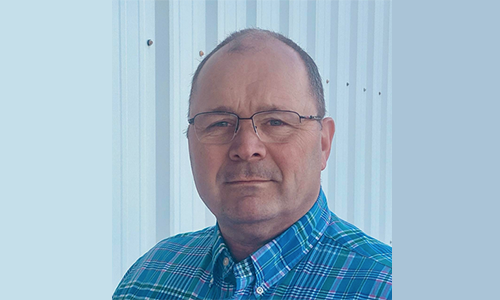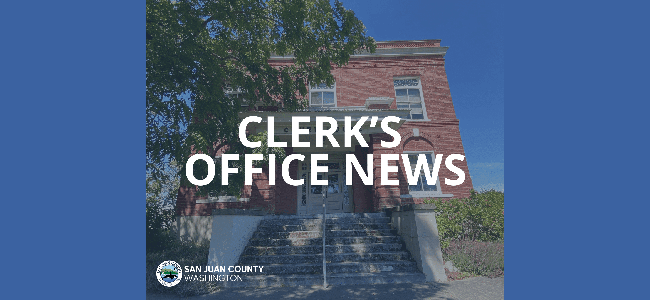Roger Sherman will pick up the conductor’s baton for the first time in many years next Tuesday, when he begins rehearsals as the new director of the Orcas Choral Society. However, he brings a lifelong practice of making music with him.
He attended Watson Groen Christian school (now Shoreline Christian) in north Seattle where music was just a natural part of the day’s routine, beginning with 15 minutes of singing every morning. By the time he was in 5th grade, he was accompanying morning singing, and at the age of 15 began to play organ for church services. In high school he was trying to decide whether to devote himself to music or science (he built a computer from scratch in junior high school, did a project in particle physics in 9th grade and wrote a mime musical as a senior).
Sherman won music scholarships to Oberlin Conservatory, where he received a Bachelor of Arts degree in music theory and history. He also studied world religions and computer science at Oberlin College.
He remains a few credits short of receiving his Bachelor of Music in Organ Performance degree, although he has been the associate organist at St. Mark’s Cathedral in Seattle for 25 years. Sherman has also sung in the Cathedral Choir and the Compline Choir at St. Mark’s.
His association with St. Mark’s Cathedral has been continuous since the 1960s, where he has also been assistant sexton, associate organist, president of Cathedral Associates (the concert presenting and public events organization), board member of St. Mark’s Cathedral Foundation and Senior Warden of the congregation. “It’s been a spiritual home for me,” says Sherman.
At Oberlin he studied choral conducting with Daniel Moe, and has sung under Dale Warland of The Dale Warland Singers, and Peter Hallock and Mel Butler at St. Mark’s, among others.
His “day job” for 10 years was with Microsoft in Redmond. He held many jobs there, including being the first director of testing during the time when Windows 95 and Office 95 were released. He was on the team that produced the first versions of Publisher, Windows Works and Microsoft Money. He also was responsible for the first independent “game” product produced by Microsoft, the Windows Entertainment Pack. It was a chaotic time with staff meetings often on Sunday morning because there was no time during the weekdays, he says.
His appreciation and study of music is both visceral and academic. He can explain early scientific theories of the organization of the universe according to rules of harmony (“The Music of the Spheres”) and the evolution of Western music along the lines of this cosmology. “He says, Western music evolved from a unique view of harmony and tuning, which was also a basis for understanding the natural world. Although our understanding of the world has changed over time, the idea that the individual elements must harmonize in some way still drives our discovery of nature, and our place in it.
Singing together is a way in which we can model and more importantly, experience a harmonious relationship with each other and the world.”
Sherman moved to Orcas Island about 10 years ago with the ideal of building a music learning center, focused around Bach. “But it was not possible at the level I wanted to achieve with the collapse of the economy” says Sherman.
Since 1993, he has produced and hosted a Sunday evening radio show “The Organ Loft” which is carried on KING-FM 98.1 and on the University of Oregon radio network, heard state-wide. After leaving Microsoft, he developed Loft Recordings as an outgrowth of the radio program. In 2001, Loft purchased Gothic Records and then Clarion Music in 2007. With the addition of these record labels, he changed the name of the business to The Gothic Catalog, and began publishing a mail order catalog of with a wide variety of recorded organ and choral music. In 2009, Gothic also acquired the rights for all recordings made at the Washington National Cathedral. Gothic’s mission is “to generate enthusiasm and literacy in classical music, particularly choral and organ music”, says Sherman.
Sherman travels worldwide, from Korea to Mexico to Sweden and elsewhere to make choral and organ recordings, then returns to edit and master the final versions at his Orcas studio.In the last 15 years, he has also coached choral directors for their recorded performances.
Sherman is also father of two sons, Peter (21) and Erik (18), both graduates of Orcas High School.
In spite of his busy schedule, he says he welcomes the chance to direct the Orcas Choral Society. “I feel very fortunate for the opportunity to make music with such talented and interested people”, he says. “I love choral music; there’s nothing like it in the whole world.” Sherman appreciates that singing is communal spiritualism, somewhat different from individual spiritualism. “All singing is spiritual in nature.
The words ‘spirit’ and ‘inspire’ come from the Latin word that means ‘breath’, and choral singing, at its very core, is breathing together,” he says.
According to a recent study commissioned by Chorus America over 32.5 million Americans sing regularly in choirs, and that number is growing. When children are included, the number is 42.6 million, making choral singing the most popular form of participation in the performing arts for both adults and children.
“All the concerts by the Choral Society [that] I heard over the past decade were impressive”, Sherman says. “Catherine Pederson did a fantastic job, both in the music the choir created and from an organizational standpoint. It’s remarkable and unusual for many non-profit organizations to survive the retirement of their founder. She also programmed a wide variety of works, and commissioned new choral pieces. The level of performance and preparation was consistently high. She was an extraordinary leader, both musically and organizationally.”
Becky Johnson, who plays French horn in Islands Sinfonia, will be the piano accompanist for the Choral Society; Sherman also plans for a variety of accompanying instruments, as well as a cappella performances.
“I’m not going to change too much,” he says. “The Choral Society is successful, you don’t just change something without a good reason.” Through his coaching sessions with conductors at various recording sessions, Sherman has been introduced to a variety of new music, which he plans to include in the Choral Society repertoire.
This fall he will direct the choir in singing “Precious Gift” by Dave Brubeck, the Christmas Cantata by Daniel Pinkham, Lux Aurumque (Golden Light) by Eric Whitacre and three beautiful songs by Mendelssohn, that were lost after World War I, and then rediscovered following the collapse of the Soviet Union in the 1990s.
Sherman welcomes prospective choir members to come to the first rehearsal this Tuesday, Sept.7 at 6:45 p.m. at the Orcas Center. “We will be going over the major works planned for the December concert.
Registration is due by the end of the second rehearsal, so you can decide whether to join afterwards!” he says. “Men are especially encouraged to come.”
“There’s a long list of things I’d love to do. We’ll all be learners together.”
**If you are reading theOrcasonian for free, thank your fellow islanders. If you would like to support theOrcasonian CLICK HERE to set your modestly-priced, voluntary subscription. Otherwise, no worries; we’re happy to share with you.**









Dear Roger,
I am an old pal of Michael Barone and have recently moved back to Seattle. I was here in the 80’s, played a bunch of post-complines, and ended up at St. Thomas, Medina. Michael suggested I contact you about the local music scene, especially Early Music. (In LA I was harpsichordist for LA Baroque). Please give me an e-jingle so that we can chat a bit.
All the best, and good luck with your fine organ program on KING.
Best, Ted.